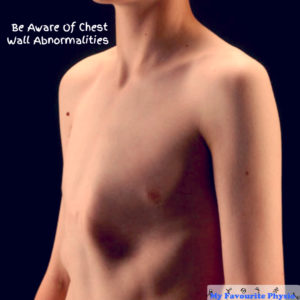19 May Have you noticed a bit of a bump in your child’s chest wall and you’re wondering if it’s normal or not

![]() Have you noticed a bit of a bump in your child’s chest wall and you’re wondering if it’s normal or not
Have you noticed a bit of a bump in your child’s chest wall and you’re wondering if it’s normal or not
A chest wall deformity is a structural abnormality of the chest that can range from mild to severe. Chest wall deformities occur when the cartilage that connects the ribs grows unevenly. ![]() It is not clear why this happens, but the condition tends to run in families.
It is not clear why this happens, but the condition tends to run in families.
The two most common types of chest wall deformity are:
![]() Pectus excavatum, also known as funnel chest or concave chest, occurs when the breastbone pushes inward. This is the most common type of chest wall deformity, affecting 1 out of every 300 to 400 children and three times as many boys as girls.
Pectus excavatum, also known as funnel chest or concave chest, occurs when the breastbone pushes inward. This is the most common type of chest wall deformity, affecting 1 out of every 300 to 400 children and three times as many boys as girls.
![]() Pectus carinatum, also known as pigeon chest or raised chest, is a condition where the breastbone and ribs protrude.The condition affects about 1 in every 1,500 children and is more common in boys than girls.
Pectus carinatum, also known as pigeon chest or raised chest, is a condition where the breastbone and ribs protrude.The condition affects about 1 in every 1,500 children and is more common in boys than girls.
Chest wall deformities often first become noticeable, when a child is 1 or 2 years old.![]() The deformity may be mild at first and become more severe during puberty, when a child’s bones and cartilage are growing rapidly.
The deformity may be mild at first and become more severe during puberty, when a child’s bones and cartilage are growing rapidly.
3 Key Signs to look for when checking if your child has any chest wall deformity.
![]() 1. Check the front of your child’s chest all. The chest bone or sternum should be flat and even to touch, with the rib cage even and symmetrical. There should not be a divot or protrusion in the front of the chest wall.
1. Check the front of your child’s chest all. The chest bone or sternum should be flat and even to touch, with the rib cage even and symmetrical. There should not be a divot or protrusion in the front of the chest wall.
![]() 2. Check for rotation in the spine. This is an indication of possible scoliosis, where the spine is rotated with one side of the rib cage protruding forward more than the other. You might also notice uneven skin folds on the side of their trunk.
2. Check for rotation in the spine. This is an indication of possible scoliosis, where the spine is rotated with one side of the rib cage protruding forward more than the other. You might also notice uneven skin folds on the side of their trunk.
![]() 3. Check the curvature of your child’s spine from the side. Look out for exaggerated hunching of the spine at upper to mid back or exaggerated arching at the lower back when your child is standing upright.
3. Check the curvature of your child’s spine from the side. Look out for exaggerated hunching of the spine at upper to mid back or exaggerated arching at the lower back when your child is standing upright.
If you are concerned about your child’s chest wall, ring My Favourite Physio on ![]() (02)9790 4233 or DM us @myfavouritephysio to speak to one of our Expert Paediatric Physiotherapists today. Early intervention is key
(02)9790 4233 or DM us @myfavouritephysio to speak to one of our Expert Paediatric Physiotherapists today. Early intervention is key ![]() to correcting chest wall deformities.
to correcting chest wall deformities.
#myfavouritephysio #pigeonchest #chestwall #paedsphysio #kidsphysio
